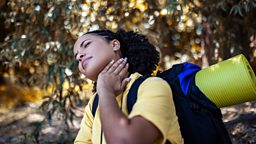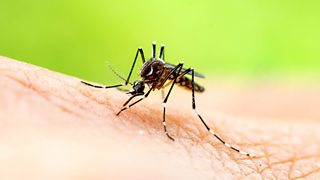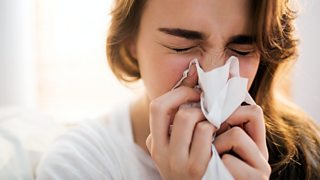Which mosquito repellents are proven to work best?
Whether you're staying in your back garden this summer or heading somewhere tropical, you'll be keen to avoid mosquito bites. There's a wide range of repellents claiming to help you do this, and avoid anything from a nasty bite to, for those travelling abroad, dengue fever or even malaria.
For 大象传媒 Radio 4's Sliced Bread, listeners Nick and Yasmine want host Greg Foot to find out which mosquito repellents actually work. Nick wants to avoid bites when he is out walking, while Yasmine often takes family trips to Zambia, including to areas where malaria is a problem.
With the help of a box full of hungry mosquitoes and Professor James Logan from the London School of Hygiene and Tropical Medicine, Greg finds out more about 'mozzie bites' and casts his net over the various options...

Only female mosquitoes bite
Greg reminds us that mosquitoes are "the world's deadliest animal" and that mosquito-borne diseases kill more than 700,000 people globally each year. So the importance of using an effective mosquito repellent cannot be overstated.

But it's only female mosquitoes that bite, and they do it because blood contains both nutrition for her and protein for her eggs.
When a female mosquito bites a human, they stick their proboscis into the skin and inject their saliva, the chemical make-up of which prevents the blood from clotting. The saliva acts like an anaesthetic, preventing the victim from feeling the bite. The bite victim's immune system reacts and that, as Professor James Logan explains, "causes the itchy red lump that a lot of people get."
Not everyone reacts the same way to a mosquito bite
The relationship between mosquito bites and the reaction to it has an arc, explains James.
"The first time you get bitten by a mosquito, you don't react at all, and then the more you're bitten the more you start to react until you become really sensitive. If you continue to be bitten, your reaction disappears completely, and your body becomes used to it."
This explains why holidaymakers are more likely to be seen with bites than locals, because they've had less time to get used to the bites.
Mosquitoes can smell feet (and other body parts)
As well as an ability to detect body heat and movement, mosquitoes have an excellent sense of smell, and since we give off hundreds of different chemicals as part of our body odour, it’s not hard for them to find us.
Among the tell-tale compounds are CO2, lactic acids, produced through the skin and carboxylic acids, produced by bacteria that live on the skin – smelly feet being one example. "If you get the second most smelly cheese in the world, Limburger cheese," says James," and you put it into a cage of mosquitoes, they'd land on it and try and bite it because they think they’ve landed on a foot."
There are synthetic and natural options for mosquito repellent
Some people actually produce natural repellents in their body, but many of us will have to rely on a product.

James says four active ingredients are scientifically proven to work on mosquitoes. Three of them: DEET, IR3535 and Picaridin (also known as Icaridin) are human-made, but the fourth, PMD, is natural (it is found in the oil of lemon eucalyptus trees and is specially formulated at a high concentration to work as a repellent).
James says if a mosquito repellent includes one of these active ingredients then it should prove effective as long as it is applied "like a sun cream" to all exposed skin.
DEET was discovered by the US Military
DEET was developed by the US military in the 1940s. Its PR isn’t helped by the fact it can melt plastic and is sometimes confused with the insecticide DDT! However, James maintains that "if you use it in the right way, and follow the label, it is perfectly safe."
He adds that the higher the proportion of DEET, the longer it will last but "you don't ever need to go above 50%".
DEET and PMD come out top in a test with 100 hungry mosquitos!
To put various options through their paces, James asks Greg to put his arm just above a mesh-topped box of 100 hungry mosquitoes, firstly with no repellent (a control test) and then with various repellent options sprayed onto his arm. It's possible to count how many mosquitoes land on the mesh and try to bite Greg, then compare the results to the control test.
DEET and PMD were both found to be highly effective with no mosquitoes attempting to bite and very few even landing on the mesh. Citronella was not as effective, although it did perform better than wearing no repellent at all. It wasn't a proper scientific experiment but the results were similar to those published in scientific research.
James says any repellent effect from citronella is likely to be short-lived and recommends products containing DEET, PMD, IR3535 or Picaridin instead, particularly if visiting areas where diseases like malaria are present.
Plug-ins can both attack and repel mosquitoes
As well as repellents, plug-ins are very useful in the fight against mosquitoes. They can have some repellent effect but they are primarily an insecticide designed to kill the insects when plugged in to an electrical socket.
"They work really well," says James, "but you have to leave them on long enough in a room so that the air fills up with the insecticide."
Other mosquito-managing measures include wearing loose clothing so that if mosquitoes bite through the material, they can't reach the skin. Air-conditioning and fans can help a bit indoors because mosquitoes don't like flying in cold air or turbulence!
To find out what Yasmine and Nick made of Greg's findings, and to also discover what helps treat the itchiness of mosquito bites, listen to the episode in full here.
The information contained in this article was correct at the time of broadcast on 13 July, 2023.

More articles from 大象传媒 Radio 4
-
![]()
How effective are these hay fever remedies?
Greg Foot looks at the various treatments available.
-
![]()
Is it worth paying for expensive sunglasses?
Eight things to consider before splashing out on new shades.
-
![]()
Is bottled water better for you than tap?
Find out how bottled brands compare with the water we get from the sink.
-
![]()
Do anti-snoring products really work?
Greg Foot looks at the options for a disruption-free sleep.





